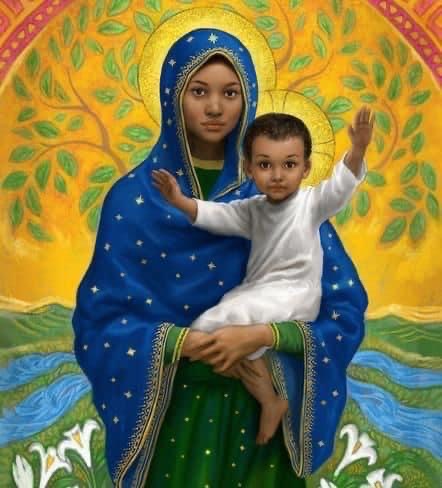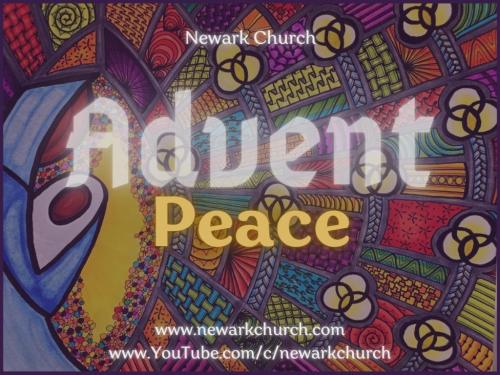Mary, the mother of Jesus, is just a young Jewish girl from a small village called Nazareth. In other words, Mary is a small-town girl. She lacks significance because she is a Jew, she is a woman, and she comes not from a prominent city like Jerusalem but a small village like Nazareth. Yet Mary, of all women, is the one whom the Holy Spirit will come upon, with Mary becoming pregnant with the Son of God in her womb.
And Mary said, “My soul magnifies the Lord, and my spirit rejoices in God my Savior, for he has looked with favor on the lowliness of his servant. Surely, from now on all generations will call me blessed; for the Mighty One has done great things for me, and holy is his name. His mercy is for those who fear him from generation to generation. He has shown strength with his arm; he has scattered the proud in the thoughts of their hearts. He has brought down the powerful from their thrones, and lifted up the lowly; he has filled the hungry with good things, and sent the rich away empty. He has helped his servant Israel, in remembrance of his mercy, according to the promise he made to our ancestors, to Abraham and to his descendants forever.”
~ Luke 1:46-55
The story of Jesus’s birth isn’t disembodied from the reality of the world. Far from taking place in a sanitized vacuum, the story that Luke tells takes place within the very struggle of human life. Jesus is born to a young girl without any significance about her. Yet Mary sees significance in what is taking place, knowing that God is redemptively at work, as she rejoices saying, “for he has looked with favor on the lowliness of his servant.”

This past Sunday was the fourth Sunday of Advent, with the theme of love and namely the love of God. So a good question might be who does God love?
Well, technically everyone. God loves everyone and so everyone matters to God. Except for the world has yet to figure this out. The powers that our world operates by don’t go courting the poor, the people of lowly stature like Mary. The lives of everyone from the unborn to minorities to the people living in both rural poverty and urban ghettos are trampled upon so that mighty and powerful can remain mighty and powerful. Yet Mary believes that God has looked on the lowly with favor because God has looked upon her
The only problem is that this blessing of salvation from God that Mary believes hasn’t exactly happened yet. That is, it is not fully realized yet and so it’s still to come and that is what Mary believes will happen. But it will only happen through the real struggles of human life, everything from the birth pains of labor to Jesus eventually being crucified on a Roman cross. So as we reflect on the story of Advent as told in the Gospel of Luke, don’t forget that this redemptive act of God is embedded within the very real human struggle of life.
There are two pictures of Mary below. One is a rendition of Mary struggling through the birth pains of labor. The other is a rendering meant to capture the beauty of Mary holding her baby, Jesus. I don’t know anything about labor pains and am not going to pretend that I do but I like the picture because its a reminder that the story of Jesus’s birth is embedded within the very real human struggle of life, which includes labor pains. But I do know what it is like to see my child born and hold that child for the very first time, as many of you do as well. And when you hold your child for the very first time, there is a beauty that words just cannot fully describe.


Taking both pictures into account, we have a reminder that God can bring about beauty from the very real human struggles of life that we all live through in one way or another. We are beautiful people that have been fearfully and wonderfully made by God but our story is also one of sin and shame, struggles with grief and doubts, sometimes so great that we want to hate ourselves.
This the love of God. As Christmas day approaches, remember that Mary believed not what God had done but what God was going to do. My hope is that as we remember the birth of Jesus, the Son of God, that we will believe as Mary believes. And so believe, not just what God did back in Bethlehem but what God is doing and will do when Jesus Christ comes again.


 Advent invites us to anticipate the coming of the Lord and with his coming, the shalōm that is the Lord’s to give. Such peace isn’t just the absence of violence, though we certainly welcome a world in which violence is no more. Peace is a life of wholeness which is concerned with the well-being of our lives so that life, in its totality, is made complete.
Advent invites us to anticipate the coming of the Lord and with his coming, the shalōm that is the Lord’s to give. Such peace isn’t just the absence of violence, though we certainly welcome a world in which violence is no more. Peace is a life of wholeness which is concerned with the well-being of our lives so that life, in its totality, is made complete. What we see in Jesus is the work of God. This is who God is and what God is doing. If we really want to know what God is about, Mark tells us about Jesus, the Son of God. This is what God is and is about. As Jürgen Moltmann says, “When the crucified Jesus is called the ‘image of the invisible God,’ the meaning is that this is God, and
What we see in Jesus is the work of God. This is who God is and what God is doing. If we really want to know what God is about, Mark tells us about Jesus, the Son of God. This is what God is and is about. As Jürgen Moltmann says, “When the crucified Jesus is called the ‘image of the invisible God,’ the meaning is that this is God, and





